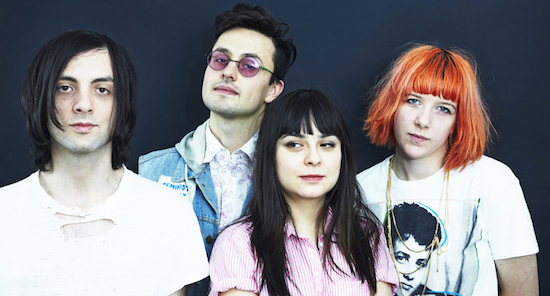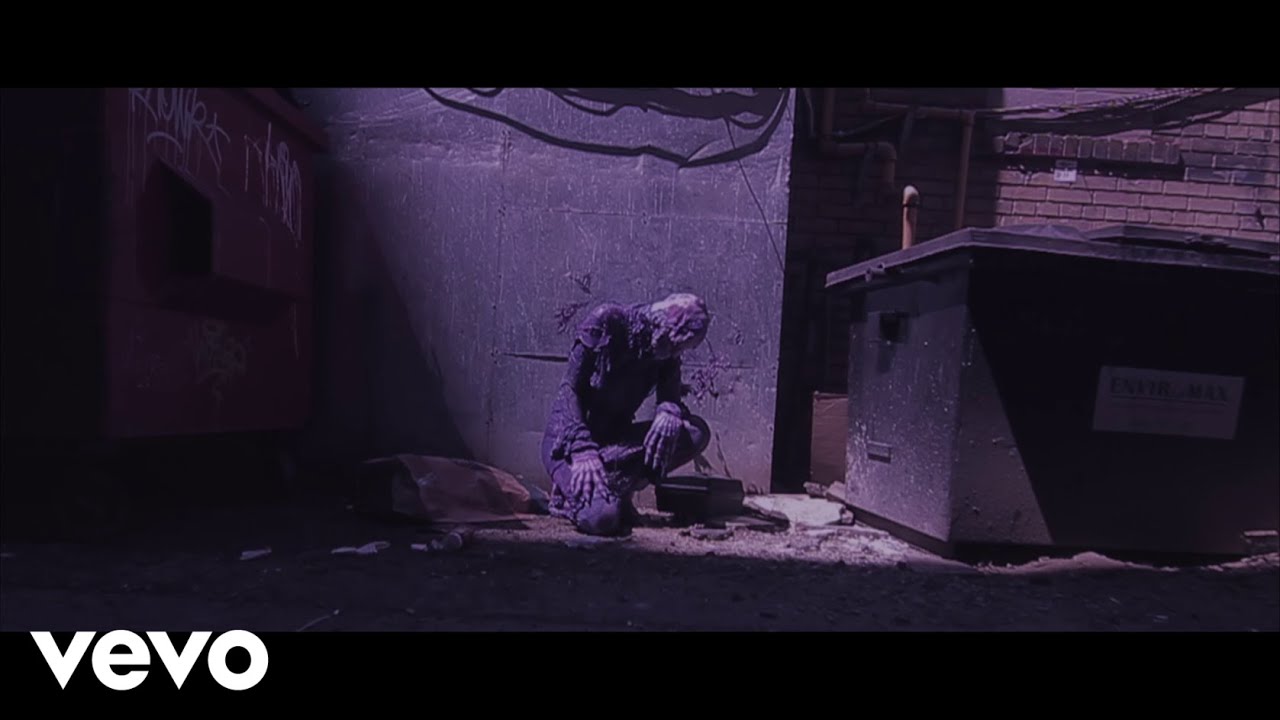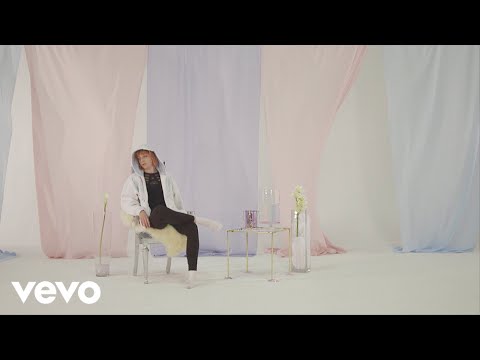Toronto is a magnificent city. From the cluster of gleaming downtown skyscrapers – seemingly stood gazing at the vast Lake Ontario – to the eclectic, multicultural bustle of the Kensington Market neighbourhood, Toronto is big enough to enthral all, even if a winter visit is often greeted by a shrieking blast of minus-35 Celsius air.
The city is also the home of a burgeoning industrial punk-pop scene. Centred around the hugely impressive Buzz Records (whose roster includes The Beverleys, Greys, Mexican Slang, Bad Channels and Odonis Odonis), it is the local four-piece Dilly Dally that perhaps best epitomise the joyous marriage of stabbing guitar noise and beefy pop hooks.
Formed in 2009 by two childhood friends – singer Katie Monks and guitarist Liz Ball – Dilly Dally are set to release a massive, in-your-face debut album, Sore. It’s a record that nods its appreciation to Goo-era Sonic Youth, Hole and the quiet-loud construct of Pixies. Monks’ throaty scream covers a range of her rage, be it about the scars of broken relationships (‘Next Gold’) or misperceptions around menstruation (‘Purple Rage’). In addition, Dilly Dally can do pop too – fabulous lead single ‘Desire’ is a lusty hunk of melodic mightiness.
When I meet up with Monks and Ball in Toronto (bassist Jimmy Tony and drummer Benjamin Reinhartz complete the line-up), we are neither atop the vertiginous CN Tower or chugging coffee in a vegan wholefood store in Kensington Market. Travel plans dictate that I’ve had to drag half of Dilly Dally to an über dull airport hotel, where our beer choice (Coors) is even duller. However, the conversation sparkles – Katie does most of the talking, but when Liz seamlessly picks up the end of sentences it’s easy to understand why the pair describe their "shared vision" of music making as "natural" and "unspoken".
The hotel’s front lobby contains a smattering of newspapers. One of them is Toronto’s weekly entertainment free sheet NOW – and Dilly Dally are the cover stars. They may be the product of the city for now, but their melodic noise seems destined to be heard in distant parts.
I believe you both met at school. What was it that drew you to each other?
Katie Monks: Liz and I grew up together in the very boring suburbs and the thing we had in common was that we partied harder than everyone else in our high school, but we got our shit done and got our grades.
Liz Ball: What we really bonded over was music. Music was very important to us.
You then decide to form a band. Did you have an initial idea of how you wanted Dilly Dally to sound?
LB: No. There wasn’t a strategy. We didn’t sit down and decide what we wanted to sound like. It was very natural and was about what we were into at any one moment. Katie would always have songs. I learned how to play lead [guitar] for her songs and then the boys joined with bass and drums. The songs would form around Katie’s initial melodies and we would then jam things out.
KM: Our music happens naturally. It is unspoken and it isn’t strategised. The fact that we are able to make music together and not speak is pretty special. If there is a shared vision, we don’t know how to put it into words, because we don’t even say it to each other. One thing we have always had an understanding about is that we have always loved simple music and we really love honest music. We never force it and there is never any trick to our songs.
The world is full of guitar bands. Did you have a sense of which ‘spot’ in the music firmament you wanted for Dilly Dally?
KM: I don’t think we would be as confident if we didn’t think there was a place for us. In the last couple of years, we have been listening to heavier music. We spent some time in the studio with Josh Korody [Fucked Up producer] and Leon Taheny [Owen Pallett, Austra]. There we were able to develop our sound a little more and the vision became clearer. We started to see there was room for us to be a part of the industrial punk scene in Toronto. We wanted to take this Toronto scene that we love and showcase it in a way that others could understand and that would perhaps be a little more accessible. That, paired with women fronting the band in neither a non-sexualised way nor a "we’re fucking feminists who will change the world" way, we would just present ourselves normally, is something that we think is a little different.
Picking up on your previous comment about loving simple and honest music and also wanting to be accessible, I would put it to you that a song like ‘Desire’ is a pop song, first and foremost. Would you agree?
KM: Absolutely. ‘Desire’ is totally a pop song. All of our songs are pop songs. It is so hard to make a cool pop song. Therefore, taking on that intellectual challenge – along with only having guitar, bass and drums and one vocalist – is, to me, like playing chess. And I am a very competitive person and I love chess. There is a total art to pop music and it is harder than anyone considers.
Your lyrics don’t pull any punches. How do you approach writing the words?
KM: For us, melody always comes first. Lyrics follow and come from a feeling. You know when they say if you write on a page and keep writing and keep writing then suddenly words will come out that you didn’t know and that you realise all these truths. It’s like that. I will sing a melody and I will mumble and then mumble some more and eventually I will make sense of some of the words.
Shit Music Journalist Question Alert. Is that a cathartic process?
KM: Is it a cathartic process? Fuck yeah.
Is that your answer?
KM: That’s my answer.
But, while cathartic, in realising these truths does that take you to places that make you uncomfortable and that you would not want to commit to vinyl?
KM: I really like this question and where your questions are making me go, but it is really hard to boil it down as it has become so subconscious. You get to a point that lyric writing just becomes another place that you go and another language that you speak. So, it’s not about a song being about a certain thing, or that you would get too scared to put a subject into a song. It’s more that you are speaking the language of the pop song. I know how to speak that language and I can go there and just do it. And the thing about pop music is that it is universal, so it doesn’t make me feel vulnerable, because it is universal and the deeper I go inside myself – and deeper we go inside ourselves – the more we connect with people because those people have the same fucking problems that we do.
You must be delighted that Sore is about to be released. It’s been six years to get to this point. Was there ever a time when you didn’t think your debut album would happen?
LB: No. You have to believe in yourself. There is an underlying confidence that comes from somewhere. If you really want to be a musician, you aren’t thinking about making millions of dollars. You do it anyway and hope you might be self-sustainable at some point. Even if we didn’t make much money, we would still be doing something music-related.
So is the hope to get to a point of being self-sustainable?
KM: Yes – and that is a realistic goal. People have been making music since the dawn of time and it is part of our lives. If you are not making it, you are listening to it and enjoying it and it is helping you through your day. If you want to contribute to that, it’s instinctual, like a mother wanting to feed her kid. Nothing will get in the way of you making music. However, at the end of the day, people are always going to take advantage of bands and artists, so we are very picky about who we work with and everyone we work with is doing it for the right reasons.
Let me challenge that a little. If McDonald’s offered Dilly Dally one million dollars to use ‘Desire’ in one of their commercials, would you take the money?
KM: [Mishearing] Madonna? She can have ‘Desire’!
Sadly, the hypothetical question is about McDonald’s and not Madonna.
KM: A million dollars for a McDonald’s commercial. It’s such a hard question and I cannot answer it in two seconds. The question is more about whether the notion of having a song in a commercial would somehow taint the reasons you were making music in the first place. It doesn’t. I’m thinking that we wouldn’t have written that song for McDonald’s – they would have chosen to use it.
Are you leaning towards taking the money?
KM: I would do it, but then I would donate shit tons of it – like 85 per cent of it – to disadvantaged kids or something. I’d take enough so we could eat decently each day and use the money to frame our lives in such a way that we could simply concentrate on making records. Seriously. We don’t want anything else. We just want to make music. And help disadvantaged children [laughs]. That was a big question. I have to say that the whole concept of a band selling out if their song is used to market a car is a total shit-full of crap. We aren’t living in the ’90s anymore and I cannot pay my fucking rent. Do people just want musicians to be homeless forever? Is wanting to eat really selling out?
So, leaving hypothetical scenarios and moving back into reality – you mentioned that you worked with producers Josh Korody and Leon Taheny on Sore. What did they bring to the record?
KM: Josh is really great at helping bands find their sound. He is like the Cool Police. It sounds so lame when I say that, but Josh will make sure that you walk out of the studio with a cool record. But then you need to have Leon, as he is the person who says, "Fuck trying to be cool, or having a certain type of sound" – he will make sure that the song takes precedence over the sound when that is required. The marriage of those two ideals is good for any band.
And if I asked you what album number two might sound like, would you know?
KM: It will be darker and more melodic. It is going to sound like Nine Inch Nails meets Sinéad O’Connor.
That would be amazing. Finally, you are playing some UK shows in January. What can we expect from a Dilly Dally gig?
KM: It’s genuine. It’s gross. It’s fun. You know when you see in a movie where someone is trying to make sure another person is not asleep and they grab their shoulders and shake the person? And they slap them in the face and pour water on them? That’s what a Dilly Dally show is like.
Sore is out tomorrow, October 9, on Partisan Records. Dilly Dally begin a US and Canada tour on October 21 at The Promontory in Chicago, IL; for full details and tickets, head here




